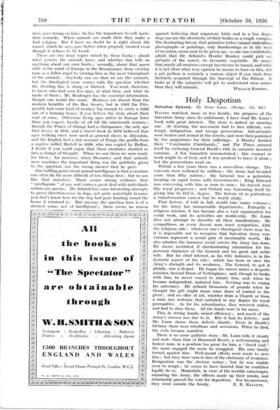• • Holy DespOtisin.
Salvation Dynasty. By Brian Lunn. (Hodge. 12s. .6d.)
HAVING watched, more or less keenly, the progress of the Salvation Army since its enliitment, I have read Mr. Lunn's book with great interest. The story is indeed an amazing one. At starting, the movement had to face ridicule, con- tempt, indignation, and savage persecution. Salvationists
were beaten and stoned in the streets, and were then punished
by the magistrates for their sufferings. A Huxley derided their " Corybantic Christianity," and The Times amused itself by enclosing General Booth's title in sarcastic inverted commas. A few Gamaliels remonstrated ; this counsel or work might be of God, and it was prudent to leave it alone ; but the persecutions went on. Within a few years there was a marvellous change. The converts were reckoned by millions ; the Army had invaded
more than fifty nations ; the General was a potentate
treating on equal terms with Governments ; King Edward was conversing with him as man to man ; his travels were like royal progresses ; and Oxford was honouring itself by giving him its D.C.L. degree. The history of so portentous a transformation cannot but be worth study.
That history, if told in full, would take many volumes ; for the Army has innumerable departments. Prima-thy a
religious mission, it has become also a vast organisation for
social work, and its activities are world-wide. Mr. Lunn does not attempt to describe all these ramifications. He
sympathises, as every decent man must sydniathise, with the religious side : whatever one's theological views may be, it is impossible not to recognise that Salvation Army con- versions represent a moral gain of inestimable worth. He also admires the immense social service the Army has done. He shows unstinted if discriminating admiration for the personal character of the General and his great and noble
wife. But his chief interest, as his title indicates, is in the dynastic aspect of the rule : which has been at once the
Army's strength and its weakness. The General, to put it plainly, was a despot. He began his career under a despotic minister, Samuel Dunn of Nottingham; and, though he broke with him,- he never ceased to admire him, and, when he became independent, imitated him. Nothing was to cramp his autocracy. He refused thousands of pounds when he thought the gift might mean some share of control to the giver ; and no offer of aid, whether from a Church or from a man, was welcome that curtailed in any degree his royal prerogatiVe. As for his subordinates, they received orders, and had to obey them. All the funds were in his name. This, in strong hands; meant-efficiency; and much of the Army's success was due to it. But it had its defects : and Mr. - Lunn shows those defects clearly. EVen in Booth's lifetime there were rebellions and secessions.- When he died, the evils became manifest. There is no more pathetic story—Mr. Lunn tells it clearly and well—than that of Bramwell Booth, a well-meaning and honest man, in- a position too great for him, a "limed soul," the more engaged the more he struggled. His own family turned against him. Well-Meant efforts were made to save him ; but they were vain in face of the obstinacy of weakness. Resignation was the' obvibui course ;.-but he was unable even to resign ; he seems to have fancied that he co. uldnot legally do so. . Meanwhile, in view of the terrible catastrophe menacing the Army, the officers made up their minds, and reluctantly passed the vote for deposition. For his successor,
they went outside the family. E. E. KELLETT.




















































 Previous page
Previous page